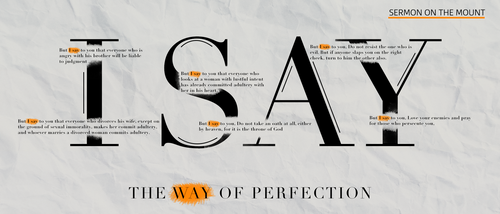Righteousness of the Heart (Day 3)

Radical Surgery for the Soul
"Jesus is not commanding self-mutilation. What He's saying is: sin is that serious. And it requires drastic measures."
Matthew 5:29-30 (ESV)
"If your right eye causes you to sin, tear it out and throw it away. For it is better that you lose one of your members than that your whole body be thrown into hell. And if your right hand causes you to sin, cut it off and throw it away. For it is better that you lose one of your members than that your whole body go into hell."
Devotional Thought
Jesus employs shocking hyperbole that would have made His first-century audience take a step or two back in unbelief. You see, in a culture where physical wholeness was highly valued and disability often meant social exclusion, suggesting self-amputation was absolutely radical beyond measure. Yet this kind of imagery serves a crucial purpose: it reveals how seriously we should take sin's destructive power.
The rabbinical tradition used similar extreme language to make moral points. The Talmud contains sayings like "Better to throw oneself into a fiery furnace than to shame someone publicly." These weren't literal instructions...but emphatic ways of communicating moral priorities. Jesus follows this tradition while intensifying it for the stakes He describes are eternal.
Jesus' radical language confronts our comfortable compromises. The "right eye" and "right hand" represent our most valuable capacities—vision and skill. He's saying that nothing, no matter how precious or useful, is worth keeping if it leads to spiritual destruction. This principle directly challenges our consumer culture's promise that we can "have it all."
Yet wisdom demands balance here. Jesus isn't advocating reckless self-deprivation or legalistic extremes that create their own spiritual problems. The goal isn't self-punishment but self-preservation. Like a surgeon who amputates a gangrenous limb to save the patient's life, sometimes drastic measures serve healing, not harm.
The key question becomes: What "surgery" does your spiritual life require?
What subscriptions, relationships, routines, or freedoms need to be "amputated" to protect your soul's health?
The rabbinical tradition used similar extreme language to make moral points. The Talmud contains sayings like "Better to throw oneself into a fiery furnace than to shame someone publicly." These weren't literal instructions...but emphatic ways of communicating moral priorities. Jesus follows this tradition while intensifying it for the stakes He describes are eternal.
- However, we must wrestle with a challenging reality: many Christians have treated sin far too casually. Let me say that again: many Christians are treating sin far too casually. We've developed sophisticated rationalization systems that minimize sin's danger.
- We compare ourselves to others rather than to God's standard.
- We negotiate with temptation instead of fleeing from it.
- We take "spiritual Nyquil" to manage symptoms while ignoring the underlying disease.
Jesus' radical language confronts our comfortable compromises. The "right eye" and "right hand" represent our most valuable capacities—vision and skill. He's saying that nothing, no matter how precious or useful, is worth keeping if it leads to spiritual destruction. This principle directly challenges our consumer culture's promise that we can "have it all."
Yet wisdom demands balance here. Jesus isn't advocating reckless self-deprivation or legalistic extremes that create their own spiritual problems. The goal isn't self-punishment but self-preservation. Like a surgeon who amputates a gangrenous limb to save the patient's life, sometimes drastic measures serve healing, not harm.
The key question becomes: What "surgery" does your spiritual life require?
What subscriptions, relationships, routines, or freedoms need to be "amputated" to protect your soul's health?
Application Questions
- Hyperbole and Truth: How do you distinguish between Jesus' intentional hyperbole and literal commands? What principles help you apply His shocking imagery to your specific situation without falling into legalism?
- Cost-Benefit Analysis: Jesus suggests that losing something valuable is better than losing everything. What seemingly "valuable" things in your life might actually be spiritually costly? How do you evaluate these trade-offs?
- Cultural Resistance: In what ways does our culture's emphasis on personal freedom and "having it all" make Jesus' call to radical sacrifice seem unreasonable or extreme?
Today's Challenge
Identify one specific area where you've been unwilling to take "radical" action because it would cost you something you value.
Ask yourself: Is protecting this thing worth the spiritual risk it creates? Take one concrete step toward healthier boundaries today.
Ask yourself: Is protecting this thing worth the spiritual risk it creates? Take one concrete step toward healthier boundaries today.
Today's Prayer
Jesus, Your words about cutting off hands and tearing out eyes shock me because they reveal how seriously You take the things I often treat casually. Forgive me for the times I've been more concerned about my comfort than my character, more worried about what I might lose than what I might become. Give me wisdom to know the difference between Your call to radical discipleship and destructive extremes. Help me to value my soul's health above temporary pleasures or conveniences. When I'm tempted to negotiate with sin or find "easier" ways around Your commands, remind me that You offer these hard words not to punish me but to protect me. Grant me courage to make the difficult choices that lead to life. In Your name, Amen.
Posted in Lust

No Comments